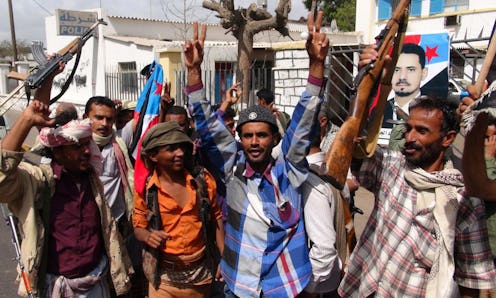News
Yemen Might Be Nearing A Civil War
There are conflicting reports as to the whereabouts of Yemen’s President Abd-Rabbu Mansour Hadi, as Yemen inches closer to a full-blown civil war. On Wednesday, The New York Times reported that Yemen’s embattled leader had fled the country by sea, while Dubai-based Al Arabiya claimed that Hadi remained in Aden. The contradictory stories emerged as Shiite Houthi rebels launched an offensive against the president’s southern stronghold. Yemen is increasingly divided between Houthi-controlled areas in the north and Hadi-friendly sectors in the south. Last week, deadly suicide bomb blasts hit the capital of Sana’a, and the country’s perilous situation has progressed dramatically since then.
Yemen has been unstable following a popular uprising in 2012 that pushed Ali Abdullah Saleh from power. Since last September, the Iran-backed Houthis have been in control of swathes of Yemen’s northern regions, as well as Sana’a. During their military takeover of the capital, Hadi was placed under house arrest. He then fled to Aden, and established a seat of power there with the support of the Gulf States. Now, the Houthis have threatened that stronghold, seizing a nearby airbase — the country’s largest — in a push for control of the south.
The Guardian reports that this latest move, bringing the rebels within 35 miles of Aden, has prepared the way for a battle between Iran, backing the Shiite militia (who are also known as Ansar Allah, supporters of God, and who belong to Shia Islam’s Zaydi branch) and neighboring states who are keen to prevent the Shia republic’s increased influence in the region. On Wednesday, Reuters reported that Saudi Arabia was moving heavy military equipment to the border with Yemen; the move indicates that the oil-rich kingdom is not far away from engagement in the conflict.
Riyadh has accused Iran of ramping up sectarian tensions in the region by backing the Houthis, Reuters notes. One U.S. military official told the agency that Saudi Arabia might be contemplating air strikes to defend Hadi if the rebels threaten Aden. The move comes after Hadi asked the UN Security Council to authorize an intervention to assist his government against the rebels. He hoped for military help to protect Yemen from “Houthi aggression,” Al Jazeera reported. Saudi Arabia's foreign minister said Monday, that “if the Houthi coup does not end peacefully, we will take the necessary measures for this crisis to protect the region.”
On Tuesday, the Houthis secured the central city of Taez. Protests broke out there, and in the town of Torba (60 miles away), as citizens rebelled against their invaders. Demonstrations demanding Houthi withdrawal were met with real bullets and teargas, The Guardian reported. Six protestors were reportedly killed in the skirmishes, while many more were injured. “Torba turned into a ball of fire,” Khaled al-Asswadi, a resident of the city, told The Guardian. Yemen’s Socialist party cautioned that the Houthis’ advance on the Sunni-majority south would result in “sectarian war.”
According to The Guardian, ousted former president Saleh has been accused of remaining active in the country via his government loyalists. He has apparently now aligned himself with the Houthis, his supporters assisting in the rebel takeover of Taiz. Gun fights between Houthis and Hadi-loyalists continue sporadically across the country. Saleh advised against foreign intervention in Yemen on Wednesday, saying the nation would respond to foreign aggression “with all its strength.”
There has been no confirmation of Hadi’s whereabouts, though witnesses told the AP that a convoy of presidential vehicles left the president’s Aden palace on Wednesday. Officials told the agency that Hadi was planning to oversee the government’s military response to the Houthi advance from an undisclosed location. Al Arabiya reported that unidentified warplanes had flown over Aden on Wednesday, firing missiles at the neighborhood where the palace is located, but said that Foreign Minister Riad Yassin had confirmed that Hadi was still in the city.
The Christian Science Monitor warns that Yemen’s conflict is increasingly progressing along sectarian lines. Al Qaeda in the Arabian Peninsula is an ever-present threat, and the Sunni extremist group could gain new footholds as the country descends into chaos. ISIS eventually claimed the bomb blasts in Sana’a last week, and spoke of an “upcoming flood” of attacks against Houthis. Alexis Knutsen, Yemen analyst for the American Enterprise Institute’s Critical Threats project in Washington, told The Monitor that the group’s involvement in the country could be a watershed. He said:
The emergence of IS in Yemen may fuel a broader sectarian conflict… The conflict has reached a tipping point, and the international community needs to get both the al Houthis and Hadi to the negotiating table before the situation spirals out of control.
Images: Getty Images (3)
